As someone who was born, raised and still currently resides in St. Louis, MO, I’ve been watching the scenes in Ferguson (a suburb of St. Louis County) unfold these past few days with both heartache and outrage. Heartache for the people whose dreams have been affected by the violence in the streets and outrage for the people whose dreams have been affected by the verdict on Monday night.
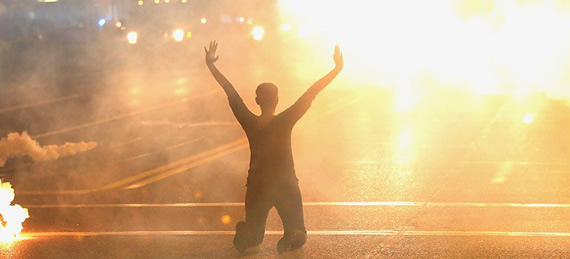
From the beginning, when this case presented itself on local and then national television screens and social media feeds, it was never just about the events that led to the death of Michael Brown at the hands of police officer Darren Wilson. This case was the proverbial “straw that broke the camel’s back.” Funny phrase, that is. If it were to literally come true, can you imagine what might take place if you were the camel’s caretaker? The camel collapses, and you start retracing your steps into the immediate past to reveal what you think is the cause of the problem. You would form an opinion based on your look into the past about what it was that made the camel collapse. You might say to yourself, “Next time, I won’t put that last straw on the camel’s back.”
But then you’d be missing the point entirely, wouldn’t you? It wasn’t the last straw that broke the camel’s back. It was the collective amount of weight you required the camel to carry for a long period of time that made it appear as though the camel collapsed under the final added weight of that tiny straw. It wasn’t the tiny moment in time that produced the final outcome, it was the collective moments of time that added up to produce the broken camel. The straw was the cause, but the weight over time was the source.
And that, my friends, is why we are collectively missing the point when it comes to Ferguson. We are pointing our fingers at the shooting of Michael Brown (the cause) while failing to see the history of objectification and marginalization that preceded this event (the source). And if we want to see any real change take place from this moment of crisis, then we absolutely must look at the real sources of the problems and not just at the immediate causes.
President John F. Kennedy, in his convocation of the United Negro College Fund in Indianpolis, IN on April 12, 1959 said, “When written in Chinese the word crisis is composed of two characters. One represents danger, and the other represents opportunity.”
So, let’s explore the dangerous opportunity in front of us by looking at 3 huge sources of the Ferguson response and how we can help things move in the forward direction that we all desire.
Source #1 – Lack of Empathy
As a life coach, I’m an expert helping people change. The very first step I instruct all my clients to take when attempting to create changes in their relationships with others is to understand and appreciate the other person’s world. Without this important step, no change will ever take place. Why? Because empathy is the mother of influence.
Author Anais Nin was once wrote, “We don’t see things as they are, we see them as we are.” The tendency of all human beings is to compute whatever events or situations are taking place through the lenses of the question, “How does this affect me?” It’s not natural to place yourself in someone else’s shoes and see what they may be seeing.
Swiss developmental psychologist, Jean Piaget, once conducted an experiment with a young child where he held a colored cube in his hands and sat across a table from the child. The cube was one color, let’s say red, and had one side that was colored something different, let’s say orange. Piaget showed the cube to the child and showed that there was one differently colored side. When Piaget was ready, he placed the cube on the table in between them with the orange side facing himself and the red side facing the child. He then asked the question, “What color do you see?” To which the child replied, “Red.” Piaget then asked the child, “What color do you think I see?” To his surprise, the child said, “Red.” How could the child be so confident that the doctor saw the same thing as he was seeing even when he was made aware of the different color facing the doctor? Because, as Piaget surmised, we don’t naturally see things as they are we naturally project what we see to be reality for everyone around us.
When it comes to race relations in the United States we are doomed to fail as long as we only see things through our own perspective. The truth is, the Michael Brown case is a microcosm of the much larger problem at hand.
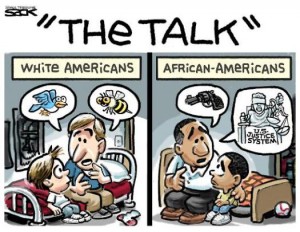 I have my mother to thank for a heart towards the black community. When I was very young she made sure to expose me to the musical works of Motown and other R&B favorites while simultaneously placing the civil rights movement that she lived through at the front of her storytelling. I always understood that their world was very different from mine simply because of the color of their skin. It was a privilege to be white, but not one that I took lightly or proudly. It was the weight of knowing that I had access to things my black friends didn’t have access to. It was the privilege to speak my mind when an authority figure was acting unjustly (I have a lot of cop stories from riding in the car with my black friends). It was the knowledge that the quality of my life was better simply because of my skin color. And it was the realization that it wasn’t right.
I have my mother to thank for a heart towards the black community. When I was very young she made sure to expose me to the musical works of Motown and other R&B favorites while simultaneously placing the civil rights movement that she lived through at the front of her storytelling. I always understood that their world was very different from mine simply because of the color of their skin. It was a privilege to be white, but not one that I took lightly or proudly. It was the weight of knowing that I had access to things my black friends didn’t have access to. It was the privilege to speak my mind when an authority figure was acting unjustly (I have a lot of cop stories from riding in the car with my black friends). It was the knowledge that the quality of my life was better simply because of my skin color. And it was the realization that it wasn’t right.
Being able to place myself in my friends’ shoes made me a better person, a better friend, and diffused many situations that I would never have been able to understand as a white man. Empathy is the mother of influence, and without it there’s no hope of creating any lasting change.
If you want to move this crisis from danger to opportunity, try placing yourself in the shoes of others. See the world from their perspective instead of computing the events taking place through only your own understanding. What do you see now?
Source #2 – Low Expectations
My children attend a local Montessori school. The first time I ever set foot in a Montessori classroom, my mind was blown. Was that an 18-month old child drinking from a glass mug? Was that a 3-year old mopping up the liquid mess they had made on the floor, and doing a good job of it? Was that a 5-year old writing in cursive and multiplying numbers? It was! And I was hooked. Maria Montessori understood something that we have yet to grasp at the institutional educational level. It was simply – greater expectations equals greater performance.
Have you ever heard of the Pygmalion Effect? It’s a psychological phenomenon that refers to the studies done by Robert Rosenthal and Lenore Jacobson. They postulated that there was a direct correlation between the expectation of others and the outcome you could expect from the subject. All the students at a California elementary school were given an IQ test at the start of the school year and the scores were withheld from the teachers. Rosenthal and Jacobson then told the teachers that there were “spurters” in their class (students that were expected to perform better than their classmates academically) and gave them their names. Even though there was no scientific evidence to support the claim that these children were “spurters” (or that spurters even exist), the teachers seemed to subconsciously treat them differently. At the end of the study, all students were again given the same IQ test that showed them all increasing their scores and the “spurters” showing significantly greater gains. The study concluded that biased expectancies could affect reality and create self-fulfilling prophecies.
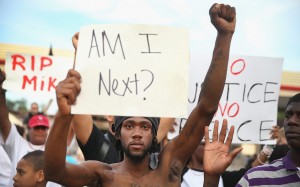 Why does all this matter to the crisis in Ferguson? Because some of the most insensitive and biased comments coming from the social media news feeds are aimed towards black males. They may be one of the most marginalized people groups in the world, and the numbers don’t lie.
Why does all this matter to the crisis in Ferguson? Because some of the most insensitive and biased comments coming from the social media news feeds are aimed towards black males. They may be one of the most marginalized people groups in the world, and the numbers don’t lie.
According to statistics compiled in the documentary film American Promise, black boys are twice as likely as white boys to be held back in elementary school, three times as likely to be suspended from school and half as likely to graduate from college. According to the NAACP, black males make up one million of the estimated 2.3 million total prisoners incarcerated in the United States and 49% of all black males will be arrested before their 23rd birthday. According to the 2011 Census, 38.2% of black children live below the poverty line – the highest of any people group surveyed. And the U.S. Congress Joint Economic Committee reported that unemployment for young black men is “roughly twice as high as the rate for all young men.”
What is going on here? Could it be the Pygmalion Effect happening right in front of our very eyes? Ivory A. Toldson, from Howard University, said, “The problem with black male achievement is institutionalized, and the solution will demand deliberate systematic strategies that involve full cooperation between concerned citizens, parents, activists, teachers, school leaders and policymakers.”
I was once volunteering for a non-profit organization that organized and performed non-violence assemblies for middle and high school students across the nation. We were at a middle school in East St. Louis (where over 75% of the student population is black) and had just finished setting everything up for the assembly. We took a trip to the restroom before the students arrived and were shocked by the conditions. There were no stalls, no privacy of any kind. Just toilets and urinals out in the open with sinks on the walls. I was appalled by that experience but horrified by the way the children were treated in the hallways. Right as we exited the restroom the bell rang, signifying the end of the class period. The hallways were immediately flooded with students. They were so crammed in, that there was barely any room to walk. Caught in the chaos I heard a loud buzzing sound and looked up to see the principal (whom we had met earlier that morning) talking to the students through a bullhorn and telling them to “move it along.” I was so enraged, that as I walked past him I said, “You know, if you keep treating these kids like animals, then animals are all you can expect.” It was a sickening experience that I will never forget.
It’s time to radically raise the standard. And we can’t wait for these young men to do it for themselves alone. We must raise the standard of what we expect from black males if we are to see them achieve success and increase the quality of their lives.
If you want to be part of the solution, start with you. When you see a black male, what do you see? A problem to be fixed? Or a human being with dreams, hopes, and aspirations who has gifts to offer the world – just like you? The collective consciousness of our society must begin to expect more from these young men than just bad behavior, low academic performance, and joblessness if we want to see it change.
We may not be able to control the outcome completely because there are still personal decisions to be made by every individual, but we can certainly remove the obstacles that are a stumbling block to their path and give them the chance they so desperately need to succeed.
Source #3 – No One Wants To Accept The Responsibility For Our History
Perhaps the greatest source of the Ferguson crisis and the resulting protests and violent outrage is our collective national history. Leaders in our society want to casually project ahead and ignore the past to create the future together. But, like any relationship that suffers hardship and conflict, there must first be an acknowledgment of wrongdoing and a genuine apology before it can be mended and move forward.
In white America, there seems to be a collective ignorance of the violence with which we have treated our black brothers and sisters in the not-so-distant past. Slavery stands as one of the greatest scourges in the history of our nation. Its very existence should have shocked any human being with a conscience, but it persisted with handshakes from authority figures in both the public and religious sector who turned a blind eye to the human beings that were bought and sold like livestock and treated poorer than them.
Films like last year’s Oscar-winning 12 Years A Slave give our generation an opportunity to witness the atrocities that were perpetrated against these men, women, and children. Whites proudly elevated their own importance and selfish desires while ignoring the humanity of blacks and holding a Bible their hands. It boggles my mind when I see something as egregious as this and realize that this was only 170 years in our collective past.
For hundreds of years, slaves had their dreams trampled and their humanity stolen. They became “less than” and began to see themselves as they were treated. Their very soul was stolen and replaced with a self-defeating, self-deprecating, day-to-day mentality that didn’t dare dream of freedom and didn’t care to fight back.
When Abraham Lincoln signed the Emancipation Proclamation abolishing slavery in the United States, the law may have been changed but the hearts and minds of the people were not. For another 100 years, the U.S. legally allowed the inhumane treatment of blacks until Martin Luther King and others pushed for civil rights to be reformed. Again, the law may have changed but have the hearts and minds of the nation?
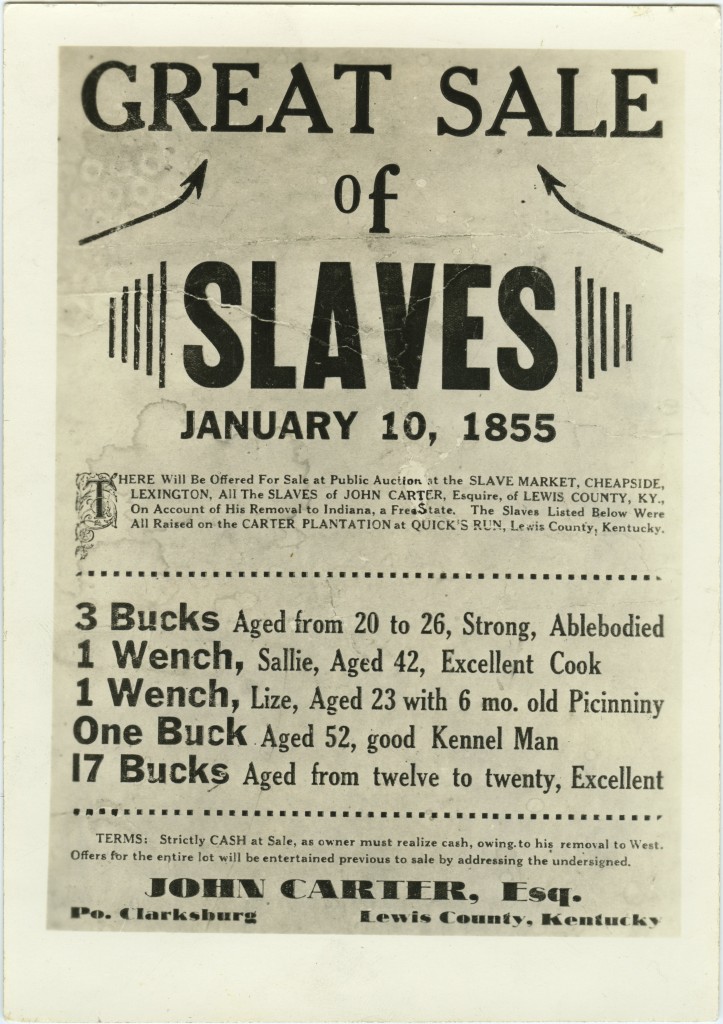 After all this time, very few white people seem to understand the severity with which our history is hindering our collective destiny.
After all this time, very few white people seem to understand the severity with which our history is hindering our collective destiny.
What would happen, though, if that all changed? What would happen if a generation rose up and understood that it was their responsibility to make it right? What would happen if we chose to take responsibility for the betterment of our relationship now by accepting responsibility for what took place in our past?
When you’re mad, what’s one of the worst things people can do around you? Ignore you, right?! You’re angry because you have something to say. You believe an injustice has taken place. The worst response you can receive from the people around you is ignorance. Let’s not make that same mistake with Ferguson. Martin Luther King said, “A riot is the language of the unheard.” Are we going to listen?
I’ll end with this story. In the summer of 2011, I was asked to speak at my good friend’s church in New Orleans. While I was traveling there, I felt compelled to research the history of the city. What I discovered was shocking. So much violence, slavery, and trafficking took place there – negatively affecting the black community. My friend’s church is a mostly black congregation in the Parish of St. Bernard, and minutes before he was to hand me the microphone to speak I was overcome with the sense of responsibility that I felt was mine to bear.
He introduced me, I took the microphone, and I began to speak. What came out was something I was not prepared for. I apologized. I apologized for the white people that marginalized their ancestors. I apologized for the leaders that looked away because it was inconvenient for them to make a stand. I apologized for the continued effects of slavery that have been ignored or minimized by the majority. And I apologized for what’s still happening between the races today. I stood in the gap of time and sacrificed my immediate comfort for the sake of restoration. It’s the least I could do, after all.
Sometimes acknowledgement is all it takes to move things forward. It happened. Really. And I honor your struggle.
I was stunned by what I had done but was immediately assured by my friend and the congregation that it was welcomed and appreciated. There were so many positive things that came out of that experience that I’ve been relishing the opportunity to do it again.
The truth is, the straw is never the source. And if we want to see a better destiny for our nation then we must first acknowledge our history.
One Final Word
As we take time out tomorrow as a nation to celebrate Thanksgiving. Let us remember to give thanks for this “dangerous opportunity” we have in our nation because of Ferguson. Let us appreciate where we came from, acknowledge our history, and create a compelling destiny.
Because the truth is, if change is to be then it must start with me.
Speak Your Mind!
Question: Alright, I’ve said my piece (or at least a part of it). What piece do you hold? Tell me what you think can move things forward. You can leave a comment by clicking here.
LIKE THIS POST?
Sign up for my email updates and never miss another one.
I'll even send you a FREE EBOOK as a thank-you :-)
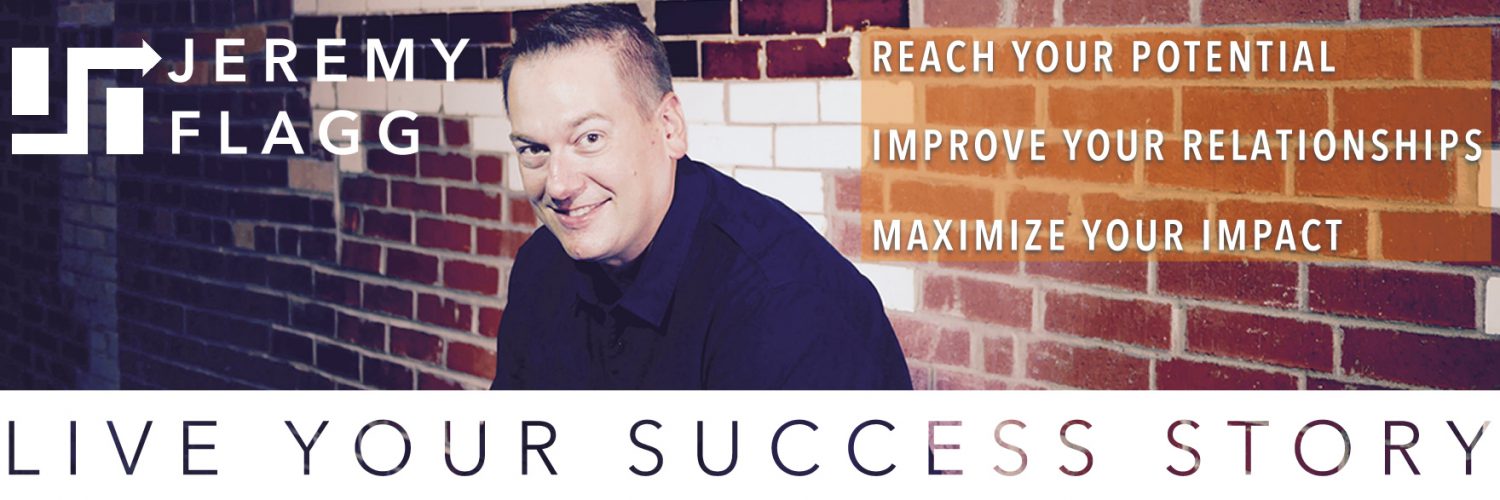
Finally……thank you. No more words, just tears.
You’re welcome my friend.
Hi Jeremy,
I am a Facebook friend, personal friend and former co-worker of both Paris Buckley Forest and her late mother, Myrtis Potter, and of Bonita Smith-Hill. They both shared your essay on FB, so, naturally, I had to read it. Because of how the page presented itself, and my natural tendency toward being absentminded, I didn’t notice your picture at the top of the page. Because of that, I had the incredibly uplifting experience of discovering, partway through the essay, that you are of the same race as I. And I plan to spend some time thinking about that, because there are certainly many more people who share genuine friendships across the racial divide. People to whom we can go, without fear of judgment, to discuss things that, through no fault of our own, we do not understand. But, these are also things that we must understand in order for future generations to grow closer.
Thank you for your essay, your insight, and your strength to write down your thoughts, and hold them up to public view.
Bless you, your family, and all of your loved ones.
Bernie
Thanks Bernie! You be blessed as well.
I have used these exact words…”the straw that broke the camel’s back”…to anyone who would listen. And lately it has become painfully apparent that most are making it a point to miss the point. A few friends of mixed ethnicity and I are planning a get together to just talk. We hope to really listen to each other and prayerfully gain understanding from one another that will help us move forward in helping others understand better as well.
Carolyn, that sounds like an awesome idea! If more of us would inconvenience ourselves and get out of our comfort zones in conversation, then maybe something radical would take place. There’s no point in talking about how to change the fruit unless you go to the root. I applaud your bravery and stand with you to make this world a better place!